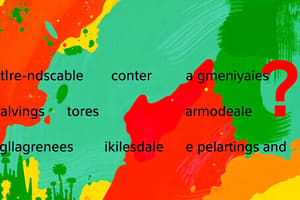Podcast
Questions and Answers
Which possessive pronoun is used for the singular informal 'your'?
Which possessive pronoun is used for the singular informal 'your'?
- Ons
- Sy
- Hulle
- Jou (correct)
What is the correct usage of the possessive pronoun 'ons' in a sentence?
What is the correct usage of the possessive pronoun 'ons' in a sentence?
- Dit is sy huis.
- Sy het hul motor.
- Jou boek is verloor.
- Dit is ons sokkerbal. (correct)
Which possessive pronoun represents ownership for 'their'?
Which possessive pronoun represents ownership for 'their'?
- My
- Hulle (correct)
- Julle
- Sy
Which statement about the forms of possessive pronouns is true?
Which statement about the forms of possessive pronouns is true?
How would you express 'the book is mine' in Afrikaans?
How would you express 'the book is mine' in Afrikaans?
Flashcards are hidden until you start studying
Study Notes
Possessive Pronouns in Afrikaans
-
Definition: Possessive pronouns indicate ownership or possession.
-
Forms:
- My: my
- Jou: your (singular/informal)
- Sy: her
- Sy: his
- Ons: our
- Julle: your (plural/formal)
- Hulle: their
-
Usage:
- Place before nouns to indicate possession.
- Example: "my huis" (my house)
- Example: "julle boek" (your book)
- Place before nouns to indicate possession.
-
Agreement:
- Gender and number of the noun do not affect the form of the possessive pronoun.
- Pronouns remain the same regardless of the possessed object.
-
Examples:
- "Dit is my motor." (That is my car.)
- "Hulle het hul huis gekoop." (They bought their house.)
-
Variations:
- Possessive pronouns can be used alone or with nouns.
- Alone: "Die boek is van my." (The book is mine.)
- With noun: "Dit is ons sokkerbal." (This is our soccer ball.)
- Possessive pronouns can be used alone or with nouns.
-
Context:
- Used in both written and spoken Afrikaans.
- Important for conveying ownership in conversation and text.
-
Common Mistakes:
- Confusing "sy" for "her" instead of "his".
- Remembering to use the right form for singular vs. plural.
-
Practice:
- Use flashcards to memorize forms.
- Create sentences to practice in context.
Possessive Pronouns in Afrikaans
- Possessive pronouns indicate ownership.
- They are placed before nouns.
- They do not change based on the gender or number of the noun.
- Examples: "my huis" (my house), "julle boek" (your book).
- They can be used alone or with nouns.
- Alone: "Die boek is van my." (The book is mine.)
- With noun: "Dit is ons sokkerbal." (This is our soccer ball.)
- Common mistakes include confusing "sy" for "her" instead of "his", and remembering to use the right form for singular vs. plural.
- Practice by using flashcards and creating sentences in context.
Studying That Suits You
Use AI to generate personalized quizzes and flashcards to suit your learning preferences.




